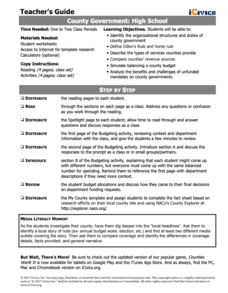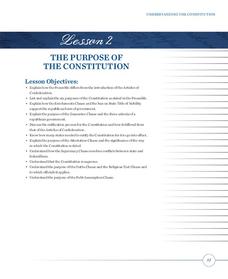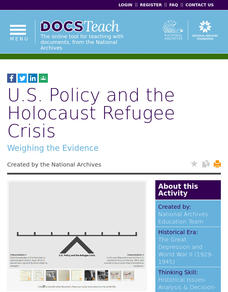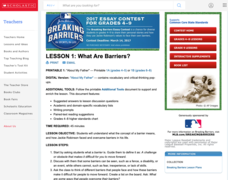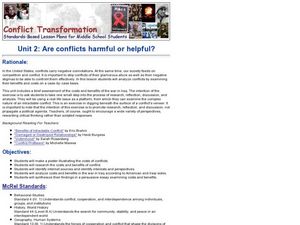iCivics
Counties Work
Turn learning into a game by asking pupils to play an online interactive activity! Learners choose their own characters, departments, work toward building the population of their towns, earn money, and must maintain an approval rating...
Do2Learn
Waiting Your Turn to Speak
Have you ever been so excited to talk that you interrupted another person? Help young conversationalists wait their turn to speak with a social skills activity.
Do2Learn
Reciprocal Conversation
Keep the conversation going with a social skills activity. Designed for learners with autism, the lesson guides peers through the back-and-forth of a conversation, encouraging them to wait their turn before responding.
iCivics
County Government: High School
Balancing a budget—the bane of many people's existence! Yet, its' something that must be done, especially in government systems. The resource, fourth in a seven-part series exploring local government, focuses on various exercises that...
Heritage Foundation
The Purpose of the Constitution
What does the Constitution have to do with my life? This is a question teachers hear on a day-to-day basis. Teach high schoolers just how relevant the US Constitution is to them today with essays, real-life connection activities, and...
Constitutional Rights Foundation
Criminal Justice in America
The allure of true crime television shows often leads to intrigue of the criminal justice system. Using a six-unit curriculum, learners explore criminology and the justice system in the United States. Topics include the police, trial...
DocsTeach
U.S. Policy and the Holocaust Refugee Crisis
How did the United States respond to the Holocaust refugee crisis during World War II? The activity focuses on the United States' foreign policies and the arguments for and against offering assistance. Scholars analyze historical...
Curated OER
The Home Front
Young historians explore life on the home front during the Civil War with primary documents and a series of writing prompts. They also watch a presentation and use a worksheet to compare how communication methods have changed over time....
Council for Economic Education
Satisfaction Please! (Part 2)
Simply understanding consumer rights may not help people solve their problems. Understanding who to turn to becomes key in many different scenarios. Teach the value of various organizations that fight for consumer rights through...
Heritage Foundation
The Office of the Executive
An executive is not just a leader of a company; you can also use the term to describe the president of the United States. The ninth part of a 20-part unit teaches high schoolers about the importance of the executive branch and the...
Heritage Foundation
Lawmaking and the Rule of the Law
How many constitutional clauses does it take to create a bill? High schoolers find out with several activities and selected clauses about the rule of law and the US Constitution. Various coinciding activities help to strengthen...
Scholastic
Lesson 1: What Are Barriers?
Scholars discuss the concept of a barrier with a short passage on Jackie Robinson. The writing process begins with a paragraph and several other sentences about Robinson's unique traits that made breaking a barrier...
World History Digital Education Foundation, Inc.
COVID-19: Geographic Diffusion
An intriguing lesson provides information to help academics understand the role of geography in the diffusion of the COVID-19 illness. Academics interpret charts and make predictions for the future. The timely resource includes...
Syracuse University
Ancient World Writing System
Most twenty-first century pupils don't know how to interpret cuneiform. Examining images of cuneiform and papyrus writing and using a chart and Venn diagram, young historians extrapolate what life may have been like for people who lived...
Perkins School for the Blind
Student Store
Vocational training activities are extremely important for learners with intellectual or physical disabilities. Here is a great idea that will help your class become skilled at money handling, basic economic concepts, interpersonal...
Family & Children's Service
Children in Change
While children may not have the opportunity to directly affect the changes happening in their family life, help them develop necessary coping skills for expressing their emotions and dealing with those changes.
Curated OER
What's My Pattern?
Students recognize, describe and extend patterns in three activities. They organize data, find patterns and describe the rule for the pattern as well as use the graphing calculator to graph the data to make and test predictions. In the...
Curated OER
Conflict Transformation
Students analyze the usefulness of conflict. In this conflict resolution lesson, students will examine several real life conflict scenarios. Students will analyze these conflicts in terms of there costs and benefits to determine weather...
Perkins School for the Blind
Let's Pretend
Playing pretend with real objects or concepts is a wonderful way for learners to make object-to-action connections, as well as practice daily living skills. Learners with visual and intellectual disabilities use a wide variety of real...
Do2Learn
Responding to Questions
Why is it important to answer a question? Assist learners with their growing communication skills with an information sheet that explains how questions are meant to gather information.
Perkins School for the Blind
Telephone Skills
What kid doesn't love talking on the phone? Learners with visual and intellectual disabilities get comfortable using several types of telephones. They begin by examining the phone, dialing, answering the phone, and then they work into...
Curated OER
Opening Doors to Social Studies with Children's Literature: The Desert Alphabet Book
Students explore the geography of the United States. In this social studies lesson, students identify the major deserts on a map of the United States.
Curated OER
The Race of Baseball All-Stars
Collect and analyze data. Pupils graph their data and model with it to solve real life problems. They use logic and deductive reasoning to draw conclusions.
Curated OER
Golden Rule
First graders discuss how others should use the Golden Rule to peacefully solve real life problems. They perform short skits that depict people breaking the Golden Rule. They work as a class to determine ways the problem could be solved....





